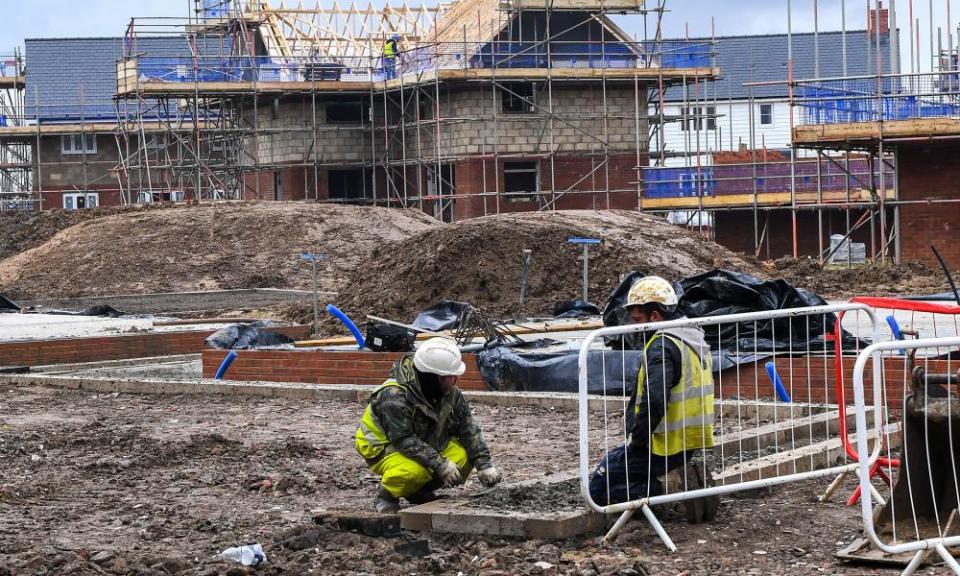Boris Johnson’s planning reforms could turn southern England into urban sprawl

The British government is trapped again by the picaresque politics of Boris Johnson. When the pandemic has subsided, the legacy of 2021 could yet be something more long-lasting – the permanent scarring of the landscape, courtesy of the 2019 parliament.
Last spring, the prime minister trumpeted the “tearing down” of English town and country planning regulations, in place since the 1940s. That was enough to have him pummelled at last month’s Chesham and Amersham byelection. The planning minister, Robert Jenrick, then protested that “tearing down” did not mean “ripping up”, whatever that means. He is now wrestling with a shambles of reform.
At the root lies Johnson’s perfectly commendable ambition to “level up” the north and south. Britain has one of the most regionally divided economies in the developed world, with parts of northern England poorer than the regions that used to make up East Germany. Johnson rightly wants to divert wealth, talent, investment and productivity in that direction, but he has no clue what this means.
Jenrick’s response is to seek to cram even more houses – and thus people – into the south-east. Backed by his army of Tory-donor property developers, he hopes to designate specific areas of countryside – mooted as “30% of UK land” – as protected, and with a casual presumption in favour of “developing” the rest. Since protection likely includes the mostly mountainous areas of Wales and Scotland, it is hard to see a vision of southern England as anything but open to a creeping, Los Angeles-style urban sprawl. This means ending 50 years of the once-prized divide between Britain’s towns and their surrounding countryside.
The ambition to promote building in the south plays on Johnson’s other arbitrary ambition, to build some 300,000 houses – their location unspecified – every year. Given that permission already exists for a million homes in land banks, this appears to be mere lobby appeasement. But the consequence will likely be a dramatic rise in housing imposed on the countryside. Analysis by the CPRE, the countryside charity, of the algorithm devised to calculate housing needs shows Johnson’s Uxbridge seat will have to find room for 10 times more houses than Rishi Sunak’s Yorkshire one. This is hardly “levelling up”, and has led Johnson’s predecessor, Theresa May, to condemn building “the wrong homes in the wrong places”, and the former Tory leader William Hague to label the proposed planning reforms “Johnson’s poll tax”.
The reality is that English housing policy is still in the dark ages. Jenrick should be promoting downsizing, taxes to discourage under-occupation, the renovation of old building and increasing housing density in suburbia. There is no need to build on greenfield rather than brownfield land anywhere in Britain. Ministers seem to think the only “real” house is a car-dependent executive home in a southern meadow. It is, as Jenrick says, a “dream” – but that is not a need.
The way to level up the regional divide is to make northern towns and cities more attractive places to live. This means stopping Manchester and Liverpool letting developers turn them into concrete jungles – and avoiding such humiliations as having Unesco this week strip Liverpool of its world heritage status. It means galvanising the creative potential of old Victorian city centres such as those of Bradford and Huddersfield. It means smart conservation, not mindless destruction. British town and country planning must recover both its architectural flair and its democratic virility.
Rumour has it that Jenrick’s department is now frantically trying to “de-Cheshamise” his planning bill. This could mean abandoning the simplistic zoning plan and restoring democratic control over planning permissions. It is absurd for him to claim that this will impede development. Some 90% of planning permissions in England go through. Otherwise local democracy’s only defence will be endless resorts to the courts. Already, judges are forced to become substitute town planners. Hence Johnson’s frantic steps to curb judicial review. The man is, heart and soul, an anti-democrat.
Related: ‘It’s tearing us all apart’: housing plans in Sussex turn nimby against nimby
Jenrick’s other controversial proposal is to loosen restrictions on change-of-use in high streets, to hasten their switch from communal hubs into “volume” housing. That high streets need reappraisal is beyond doubt. The idea that local people deserve no control over the future of their high streets is centralist arrogance.
Jenrick has recently claimed to want houses to be “built of local materials” and erected in tree-lined streets. So do we all, where appropriate. But who is to decide? The answer is apparently a corps of Whitehall aesthetes, replacing generations of planners responsive to their residents. These decisions must be returned to localities. Like politics, all true planning is local. Many terrible things may happen to Britain in the aftermath of the current pandemic. It would be a tragedy if the guardianship of the built and rural environment becomes another casualty. We are told that Britain is not going the way of Los Angeles. Would someone kindly explain how?
Simon Jenkins is a Guardian columnist

 Yahoo Finance
Yahoo Finance 